Google backed on limiting search results over right to be forgotten
- Published

The decision could mean Google only has to remove searches with EU nations
A senior adviser to the European Court of Justice (ECJ) has backed Google's legal bid to limit individuals' "right to be forgotten" to searches in Europe.
Google sought to limit the law's scope, after France asked for it to be extended globally.
The law lets people ask Google to remove information deemed "inaccurate, inadequate, irrelevant or excessive" from its search engine.
ECJ rulings typically follow the adviser's decision.
Censorship aid
The court is scheduled to make a decision about which nations were subject to the right later in 2019.
In his official statement, Advocate General Maciej Szpunar said searches carried out in nations outside the EU should not be affected by the "right to be forgotten".
"The fundamental right to be forgotten must be balanced against other fundamental rights, such as the right to data protection and the right to privacy, as well as the legitimate public interest in accessing the information sought," he said.
Mr Szpunar added that once information to be removed had been identified, search firms in Europe should do all they can to remove entries.
Peter Fleischer, Google's senior privacy counsel, said."We've worked hard to ensure that the right to be forgotten is effective for Europeans, including using geolocation to ensure 99% effectiveness."
Europeans gained the right to petition major search engines to remove information in 2014.
The call for the ECJ to decide about the law's reach grew out of a 2016 clash between Google and the French data regulator CNIL.
It fined Google 100,000 euros (ÂĢ90,000) because it did not remove information across national boundaries. Google appealed against the fine and kicked off the legal examination.
In its court statements, Google argued that extending the law could help "less democratic" regimes use it as a tool for censorship.
Mr Szpunar's decision was welcomed by UK digital rights group Article 19 which said: "European data regulators should not be able to determine the search results that internet users around the world get to see."
- Published11 September 2018
- Published20 March 2018
- Published28 February 2018